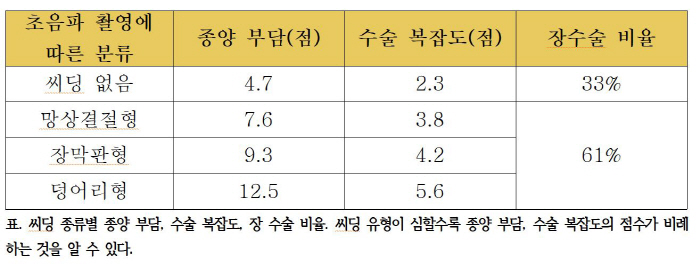A simple ultrasound test can predict the difficulty of ovarian cancer surgery
Aug 26, 2025
|
In particular, it can be used as an important indicator for establishing treatment strategies by confirming the scientific evidence that additional intestinal surgery can be determined according to the type of 「Douglas and seeding」 identified in ultrasound images.
In ovarian cancer, 'Douglas'pouch' refers to the space between the uterus and rectum in the abdominal cavity. When ovarian cancer metastasizes into the abdominal cavity, tumors are often found in the Douglas and is an important indicator for diagnosis and staging.
In order to determine the optimal direction of treatment in gynecological cancer patients, it is necessary to predict the difficulty of surgery and determine whether additional intestinal surgery is necessary. To determine this, the size and location of the tumor are generally confirmed by imaging tests such as computed tomography (CT) or magnetic resonance imaging (MRI). However, small tumors in the abdominal cavity are often prevalent in ovarian cancer, making it difficult to identify all microscopic tumors only with existing imaging tests.
As a result, it was determined that the tumor could be completely resected, so the surgery was planned, but in reality, there were cases where surgery was impossible due to widespread seeding. On the contrary, it was determined that it would be difficult to completely resect all tumors, so the surgery was planned to remove only large tumors, but contrary to predictions, there were cases where the operation was changed to remove all tumors.
Accordingly, Professor Kim Ki-dong's team conducted a study to see if the difficulty of surgery can be predicted using ultrasound. The study was conducted on 85 patients who underwent surgery for advanced ovarian cancer from 2022 to 2023 at three hospitals in Korea, and based on preoperative ultrasound, it was classified into four stages: ▲ no seeding ▲ reticular nodule type (small tumor nodules spread like nets) ▲ serosal plate type (tumor spread widely but thin) ▲ mass type (tumor spread widely and widely).
Afterwards, tumor burden and surgical complexity were scored for the form of seeding that was confirmed in advance during actual surgery. Tumor burden is an index that evaluates tumor burden by dividing the abdominal cavity into 13 areas and giving 0 to 3 points (the higher the score, the greater the burden, 39 points), depending on the size of the lesion in each area, and surgical complexity is used to predict the difficulty of surgery by evaluating the degree of tumor invasion in surrounding organs.
Studies have shown that the higher the stage of seeding type observed in preoperative ultrasound, the higher the actual confirmed tumor burden and surgical complexity during surgery. The average tumor burden score for the patient group without seeding observed was 4.7 points and surgical complexity was 2.3, but in the patient group with confirmed lump-type seeding, it was more than twice as high as 12.5 points and 5.6 points, respectively.
In addition, in ovarian cancer, all tumors in the abdominal cavity that have invaded the organ must be removed, so intestinal surgery such as rectal resection can be performed at the same time. In the patient group without seeding, the rate of additional intestinal surgery was 33%, while the rate of intestinal surgery in the patient group with seeding was 61%, suggesting that the need for intestinal surgery can be predicted by the presence or absence of seeding.
This study is significant in that it found that the seeding type observed by preoperative ultrasound was closely related to tumor burden and surgical complexity and suggested the possibility of optimizing the surgical plan based on ultrasound results.
Professor Kim Ki-dong said that "ultrasound examination is a highly accessible examination that can be performed immediately even during outpatient treatment", and added that "forecasting the difficulty of surgery and the need for additional bowel surgery through the confirmation of Douglas and myseed type with ultrasound will be of great help in establishing patient-specific treatment strategies".
The study was published in the journal 『European Journal of Surgical Oncology』, a European journal of oncology.
|
This article was translated by Naver AI translator.















